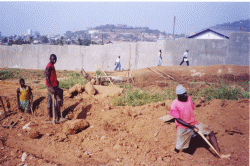 Freetown is capital to one of the world's poorest countries. Homes, churches, schools --- even the Parliament building --- lie in charred ruins. Thousands of jobless people displaced by ten years of war throng the sweltering streets. But across town in a restored villa once occupied by rebels, computers and air conditioners hum and cokes are on ice. War crimes investigators and prosecutors for Sierra Leone's Special Court are gathered for an early morning meeting in a basement room they call the "Bunker." Leading the meeting is Gilbert Morrisette, a former detective in the Royal Canadian Mounted Police. The group sitting around the table reflect the unusual mix of the prosecution staff --- there are Americans, Swiss, Canadians and others who work together with Sierra Leone police and lawyers.
Freetown is capital to one of the world's poorest countries. Homes, churches, schools --- even the Parliament building --- lie in charred ruins. Thousands of jobless people displaced by ten years of war throng the sweltering streets. But across town in a restored villa once occupied by rebels, computers and air conditioners hum and cokes are on ice. War crimes investigators and prosecutors for Sierra Leone's Special Court are gathered for an early morning meeting in a basement room they call the "Bunker." Leading the meeting is Gilbert Morrisette, a former detective in the Royal Canadian Mounted Police. The group sitting around the table reflect the unusual mix of the prosecution staff --- there are Americans, Swiss, Canadians and others who work together with Sierra Leone police and lawyers.
Morrissette shouts out numbers that signify witnesses who will be interviewed again as prosecutors ready the first indictments. The witnesses names are a closely guarded secret. Unlike the international tribunal in The Hague, this court is based in the middle of the killing fields where thousands of victims and ex-combatants live side-by-side in a potentially explosive setting. So secrecy is paramount.
When the meeting's over, everyone puts their notes through a shredder. The remains are burned in an outdoor fire pit. Team members then fan out to their day's assignments.
On a hillside at the outskirts of Freetown, American investigator Corinne Dufka is picking her way through the rocks and rubble of a cluster of wooden houses.
Corinne greets smiling families who emerge from their ramshackle homes. She addresses them in the local Krio
and explains her mission:
"How da body. We're with something they calling the special court. The Special Court of Sierra Leone."
"This is the way we do preliminary investigations," Dufka explains, "just go walk around and talk to people."
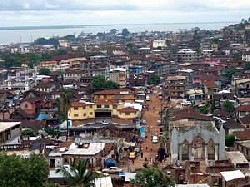 As she walks along winding paths, Dufka passes blackened patches of dirt, the remains of homes that were burned down in 1999 when rebels and rogue army units invaded Freetown. The attack on Freetown came eight years after forces of the Revolutionary United Front (RUF) launched a rebellion nominally aimed at ending poverty and government corruption. The civil war that followed in the wake of the rebellion killed tens of thousands but was largely ignored by the United States. Ultimately regional peacekeeping forces and the British Army subdued the rebels and they signed a peace treaty. The Special Court was established last year with the backing of the U.S. government. Investigators like Corinne Dufka are now working with Sierra Leoneans, combing the country for evidence that will show that the atrocities were systematic.
As she walks along winding paths, Dufka passes blackened patches of dirt, the remains of homes that were burned down in 1999 when rebels and rogue army units invaded Freetown. The attack on Freetown came eight years after forces of the Revolutionary United Front (RUF) launched a rebellion nominally aimed at ending poverty and government corruption. The civil war that followed in the wake of the rebellion killed tens of thousands but was largely ignored by the United States. Ultimately regional peacekeeping forces and the British Army subdued the rebels and they signed a peace treaty. The Special Court was established last year with the backing of the U.S. government. Investigators like Corinne Dufka are now working with Sierra Leoneans, combing the country for evidence that will show that the atrocities were systematic.
"We believe there were different squads of groups that had particular names. Cut hand unit, burn house unit, victims will say this" she notes. "What that suggests is the violence was organized, it wasn't random."
Since rebels rarely issued written orders, eyewitness testimony is crucial. On this day Dufka is looking for a place called the Black Tank, where she's heard rebel's hacked off the limbs of men, women and children. In front of one home, Dufka finds a young girl who clearly witnessed something terrible.
"Hello young lady," says Dufka. "How many years you got?"
"Six."
"Hey, you tall for six years..."
The little girl's arm ends at a stump just below her elbow. Dufka asks whether anyone witnessed the girls maiming. At first several people say they did, but after much conversation, it turns out the child was with her uncle when it happened and he is dead. Dufka takes down the girl's story but wintout the uncle it will be of little help to prosecutors.
Many of the crimes Dufka is investigating involve children, who were victims and perpetrators. Throughout the war, rebels abducted thousands of kids, saying they would form the bedrock of a new, revolutionary state. . The children were forced to work and to fight. Girls were used as sex slaves. Rebel commanders were often little older than teenagers. But the court is not prosecuting children. Its mandate is to try a small number of adult suspects who bear the greatest responsibility. David Crane, a veteran Pentagon lawyer, is the Court's chief prosecutor.
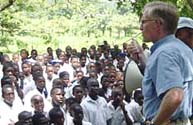 "It's not just about the boy commanders who call themselves brigadier and go off and do these horrific crimes," says Crane. "It's also about the politicians. And it's also about those who financed this tragedy. You have to remember this war started not for religious or ethnic reasons, social or political reasons even though there was a thin veneer of politics initially. But for the control of a commodity."
"It's not just about the boy commanders who call themselves brigadier and go off and do these horrific crimes," says Crane. "It's also about the politicians. And it's also about those who financed this tragedy. You have to remember this war started not for religious or ethnic reasons, social or political reasons even though there was a thin veneer of politics initially. But for the control of a commodity."
And that commodity was diamonds - which Sierra Leone has plenty of. Many of the world's finest quality diamonds are harvested from its alluvial plains.
Slavery in Kono
Here in the eastern Kono district, 30 miles from the Liberian border, people still remember the discovery of the dazzling "Star of Sierra Leone" diamond. Tribal chiefs in this area were once the most proud and prosperous in the country. Now, it's a place where people wrestle with the shame of their recent enslavement by the rebels.
In the village of Tombodu, a group of men stand at the edge of one of the scores of water-filled mining pits scattered nearby. They call this one "Savage Pit." It's named after one of the rebel commanders who held sway here for two and a half years.
Tomu Ngekia was made overseer of the hundreds of people from the area forced to dig for diamonds - often watched over by child rebels with guns.
"The moment you are given a shovel to go down there," describes Ngekia, "and work you are like a machine...continuously operating 24 hours. You get tired you collapse there and die, it's not their business."
And when they dropped from exhaustion...the roped slaves were thrown into the old mining pit. The men say many of them were still alive.
"Everyone expects the quantity of bones from here will be quite alarming, " says one
man.
Prosecutors say the use of slave labor was one of the many crimes in Sierra Leone driven by economics. They say the rebels used slaves to extract vast quantities of so-called blood diamonds, which were sold for weapons. The business drew an unsavory cast of characters from around the globe - gunrunners from eastern Europe, drug dealers, money launderers and sometimes terrorists.
Diplomats, investigators and a human rights group prosecutors say that the illicit diamond trade even attracted operatives from al Qaeda.
Far from a local tribal conflict, the war itself became a huge snatch and grab. In legal terms it's called a joint criminal enterprise, where players aided and abetted the crimes in Sierra Leone for their own profit. Chief Prosecutor David Crane compares his job to going after drug lords.
"It's like a drug cartel case. In order to prove aiding and abetting, in order to indict for criminal responsibility," explains Crane, "you have to turn the inner circle, so that they'll in fact testify against the big fish."
And prosecutors are doing just that. In a windowless, white steel container outside the prosecutor's office in Freetown, a witness from the rebels' inner circle is about to be debriefed by special court investigators.
As chief of investigations for the prosecution, Al White spends much of his
time coaxing high level witnesses .
"This was one of the key witnesses we developed early on," says White, "and he's decided to cooperate for a variety of reasons and the information he provided has been extremely critical in going after some of the senior leadership. He's absolutely crucial to our prosecution."
Inside the container two Canadian investigators question the witness about the top rebel leader, Foday Sankoh, carefully checking names, ranks and other details of his senior officers.
"So on this chart we have Foday Sankoh headquarters at Zagata,"
says a UN investigator. "That's correct, " confirms the witness.
The witness's voice has been electronically altered to protect his identity. Investigators ask him about a suspect who allegedly brokered business deals enabling the rebels to trade diamonds for weapons, drugs, and other supplies.
A second UN investigator asks, "You said before he was coming to report to Foday Sankoh about what he had done. So what did he do for the RUF? What was his role?"
Witness: "Sometimes he'd come in with drugs. Sometime he's come in with physical cash."
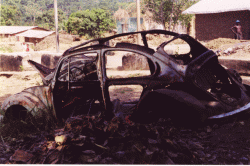 High-level witnesses like this man enable prosecutors to tie atrocities to specific commanders and in turn link those commanders to outside players such as financiers and arms dealers. Of course, the testimony will have to hold up before the court's panel of judges. But it is not the only kind of evidence in the prosecution's arsenal. Like many conflicts today, Sierra Leone's war was often fought over the airwaves.
High-level witnesses like this man enable prosecutors to tie atrocities to specific commanders and in turn link those commanders to outside players such as financiers and arms dealers. Of course, the testimony will have to hold up before the court's panel of judges. But it is not the only kind of evidence in the prosecution's arsenal. Like many conflicts today, Sierra Leone's war was often fought over the airwaves.
[recording of a radio broadcast]
"We are in complete control of city. The armed forces and the Revolutionary United Front are taking over the reigns of government."
Statements like this radio broadcast, and even signatures on ceasefire agreements, provide something prosecutors call open source evidence. Brenda Hollis is a retired United States air force lawyer and a senior trial attorney with the prosecution.
"If you look at open sources such as interviews or radio or tv," explains Hollis, "people say I'm such and such and I'm in control of such and such. You know, that's an admission."
Hollis says these statements may not prove a crime was committed but they help show who was in charge.
We found the man who made that radio broadcast during the rebel invasion of Freetown, and he agreed to speak with us at a beachside cafe.
"I'm Gibril Massaquoi, I have been the spokesman of the RUF during the war until the time of disarmament."
Gibril Massaquoi was the voice of the RUF high command and a personal assistant to rebel chief Foday Sankoh. Despite years of denials, Massaquoi now confirms the prosecution's
main allegations - that rebels had international backing and that many abuses were planned by the leadership. He says commanders even gave the operations chilling names like "spare no soul" and "no living thing".
"They were ordered," says Massaquoi. "From the top, the battalion commanders and brigade commanders. When they attack an area either you run for your life or you are going to be a dead man. In most cases Foday Sankoh was the one giving them instructions."
Massaquoi says since he was only a spokesman, and not involved in the
military operations, he's not worried about being indicted by the Special Court. That's why he lives openly in Freetown - along with many other former rebels.
And he probably has little to fear because prosecutors are looking for bigger
fish.
The Indictments
Seven months after investigators and prosecutors began work in Sierra Leone, David Crane met with senior
prosecution staff. The first indictments are finished.
"Over the weekend, I carefully read the proposed indictments that you have drafted. It's impressive. It's extremely exciting to see names, dates, offenses. Again I'm excited and we're getting ready to make history - aren't we?"
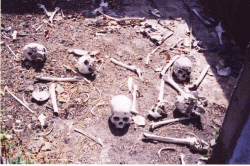 The indictments targeted seven men, rebel leader Sankoh, several of his lieutenants, and the former commander of government militias also accused of atrocities.
Charges included the use of child soldiers, a first in the history of war crimes
prosecutions. Sierra Leone police quickly jailed five indictees, including Foday
Sankoh.
The indictments targeted seven men, rebel leader Sankoh, several of his lieutenants, and the former commander of government militias also accused of atrocities.
Charges included the use of child soldiers, a first in the history of war crimes
prosecutions. Sierra Leone police quickly jailed five indictees, including Foday
Sankoh.
But instead of limiting their investigation to the country's military commanders, prosecutors targeted the rebels' support network that stretched across continents. Johan Peleman, a Belgian arms expert for the UN, was hired to investigate weapons deliveries from eastern Europe that enabled the rebels to conduct some of the most brutal operations. Peleman traced the deals to one source: "The RUF was mostly armed through Liberia."
And Peleman says the Liberian President, Charles Taylor, paid for arms with money from raw diamonds given to him by the Sierra Leone rebels.
"We have evidence of diamond traffickers who were clearly based in Liberia were driven around in government vehicles and were setting up deals with the RUF under the supervision of Charles Taylor," Peleman
continues.
Charles Taylor is a warlord turned president who rose to power during Liberia's own civil war. Taylor's gaze was often focused on Sierra Leone's diamond riches. But Johan Peleman says Charles Taylor wasn't just a broker for the rebels.
"We have witnesses who were part of the inner circle of Charles Taylor said 'we created the RUF.'"
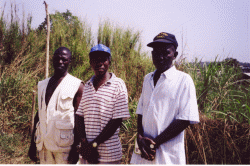 Prosecutors say this is heart of criminal network they will prove in court. Consider the chronology: A decade before he became President of Liberia, Charles Taylor
trained side by side with Sierra Leone rebel leaders in secret camps set up by Muammar Gaddafi in Libya. It was in Libya where the RUF was founded.
Prosecutors say this is heart of criminal network they will prove in court. Consider the chronology: A decade before he became President of Liberia, Charles Taylor
trained side by side with Sierra Leone rebel leaders in secret camps set up by Muammar Gaddafi in Libya. It was in Libya where the RUF was founded.
"The camps became the Harvard and Yale to a whole generation of African revolutionaries," says Stephen Ellis, an author and historian who is a senior researcher at the African Studies Center at Leiden, the Netherlands.
"They got training there, certainly military but above all they made friendships there which have continued throughout their subsequent careers."
These old school ties were the core of the conspiracy. Prosecutors won't confirm whether Colonel Gaddafi is also being investigated. But they say by indicting Charles Taylor this week they have the man who has been the chief warmonger in West Africa. Prosecutors expect, however, that Charles Taylor's indictment will most likely be challenged. Historically, heads-of-state have had immunity from foreign courts. The UN tribunal in The Hague WAS able to indict Serbian leader Slobodan Milosevic but that court has special authority from the UN Security Council. David Crane does not have that same authority, so in going after a state leader he's breaking new ground in international law. It's a bold move other governments could find troubling.
"States see this as potentially becoming a quagmire in which states are grabbing each other's leaders," says Madeline Morris, a professor of international law at Duke University and senior legal council to the prosecutor's office.
"If it's okay to indict, arrest and to potentially convict and incarcerate the head of state or other high official of another country, if one country can do that to another country, then we're in a very different arena then we've been in the past in international relations."
Charles Taylor scoffed at the international arrest warrant issued by the Special Court this week. Prosecutors could consider upping the stakes with a multi-million dollar reward for Taylor's capture. They insist they will get their man. In the meantime, even though Sierra Leone is at peace, much of the region is snarled in conflict. It's a conflict in which Charles Taylor remains at the epicenter.
In Freetown, workers with picks and shovels are hurrying to finish the courthouse for trials later this year. According to locals, several cotton trees that were cut down during construction were home to evil spirits, which have now fled.
Court officials say a key lesson in west Africa is that so-called failed states like Sierra Leone and Liberia, if neglected, can become rogue states that pose a danger to the region and beyond. Military intervention can help end a war, as it did in Sierra Leone, but much more is needed to protect the peace. It is hoped successful prosecutions could deter other leaders from mounting proxy wars and committing atrocities.

